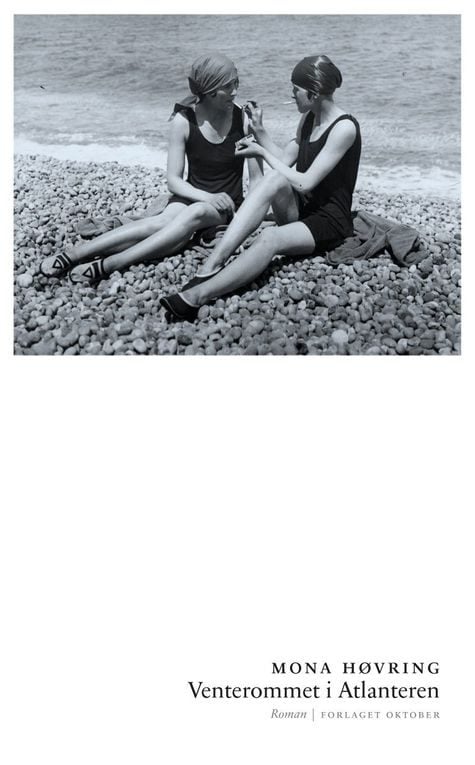“A novel about a surprising (lesbian) love affair, written in Mona Høvring’s astonishingly ‘luminous, fun, sensual and poetic’ prose … everything is permeated by an extraordinary lightness”
Mathieu Lindon, Liberation, France
“Like a tightrope walker, Mona Høvring mixes her main character’s direct, rough language with delicate observations in her examination of the couple … The author engages in a battle against the clichés and flimsiness of everyday life. It is a strategy of commitment with a single purpose – a resounding exposition of the falseness of the motto at the beginning of the novel, a motto which almost destroys Olivia: ‘more often than not, wishes lead to nothing but trouble and yearning’”.
F.M., Matricule des Anges, France
“There are certain similarities with the Icelandic writer Soffia Bjarnadottir’s Segulskekkja, but the Norwegian author has a more elliptic imagination when she lovingly observes the two young women who like to loaf around, enjoy the landscape from the window and lower their newly discovered love into the hot springs”
Livres-Hebdo, France
“Soft music distinguishes this short novel: its dramatic intensity stems from the author’s distinct way of saying as little as possible, in order to let silence speak. Quick, efficient sentences, fleeting, often surprising thoughts, her writing succeeds in creating an atmosphere which is as unique as the main character’s perspective … There is something hard, untamed, wild and deeply lovable about Olivia, which is reflected in Mona Høvring’s stripped-down prose, her dry power and finely tuned depth … The Waiting Room in the Atlantic vibrates with full strength in its seeming simplicy”
Le Courrier, Switzerland
“The Waiting Room in the Atlantic is her second novel, and Høvring brings the linguistic sensibility of a poet into her prose. It is a slim and elegant text … In only a few pages, we get to know a rich gallery of individualised and vibrant people. Høvring draws her characters and situations with the sparse but carefully chosen traits of a true artist … She writes with all her senses on full alert, and the voice of the narrator has a delicate lightness. She is also able to render the electric sparks of the very start of a crush in a dialogue that feels fresh and free of clichés”
Stavanger Aftenblad
“The contrast between the clean and feminine on one side, and the dirty, masculine on the other is put to use in an exciting way and to great effect. The island in the midst of the Atlantic, with its melting core and hot springs weaves it all together.”
Drammens Tidende
“Høvring’s prose is refined: It is lyrical, sensual, subtle … the finely tuned refinement is paired with a sort of sailor-like tendency to emphasise verbal extremities, dusty phrases and coarse adjectives … I delight in the power that literally glows from some of these sentences, and I have to laugh, even though the book thematically is about something very serious: Olivia’s anxiety and her lack of ability to fit in … Even though Høvring might be a poet first and foremost, I wish she would spend even more time writing novels likeThe Waiting Room in the Atlantic. …Høvring does her prose damn good.”
Morgenbladet
“an uplifting text about a vibrating, youthful state… [Høvring] has an eye for quirkiness; life’s little imbalances.”
Klassekampen
“This is a true love story”
Henne
“Both text and the story is carefully thought through and executed … sharp and free of irrelevance. No dead meat here.”
Haugesunds Avis
“There are few who can write as beautifully and sensuous about the unspoken as Mona Høvring … She leaves plenty of space for the contradictory and the searching, while at the same time exploring the secrets not spoken of in the relationships she depicts. There’s quite simply something very refreshingly different about Mona Høvring’s writing. Above all it is highly sensual, at the same time as her prose is as beautiful as it is elegant. The text is open and suggestive, but also playful and inquisitive”
Hamar Arbeiderblad
“inventive and minimalistic about breaking free and love between two women … Høvring mixes up established gender categories in a way which is certain to annoy all those who believe it’s about nature, not nurture – and that’s a good thing. The relation between purity and impurity is addressed on many levels in this novel, not least in the language. Mona Høvring writes a brilliant, striking (though impure) mix of vernacular and educated speech.”
Bergens Tidende
“Mona Høvring uses literature to explore existential conditions. The Waiting Room in the Atlantic shows what a good and significant writer she is … With a strong will to see and understand, Høvring depicts a fundamental disquiet, thereby showing how the hunt for coupledom might just as well be an attempt to escape one’s own disquiet as a way to find peace … What makes The Waiting Room in the Atlantic such a good novel is the way Høvring portrays a character and at the same time gives this character the space and language to reflect on the distress she feels at life … a novel which is both conscious of its own literary character and which succeeds in say something important about life”
Dag og Tid

